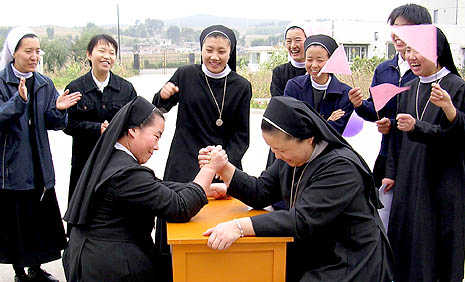
When my colleagues and I covered the National Congress of Catholic Representatives last December, our prime focus was to spotlight the result in which bishops beacme the heads of the government-sanctioned bishops’ conference and the Chinese Catholic Patriotic Association (CCPA). But we also raised our eyebrows at that time when we saw the name of Sister Wu Lin from Hubei province appear in the list of the newly elected leaders. This made her the first nun, let alone the first woman, elected to be a vice-chair of the CCPA. Leaving aside the controversy of the congress, the lifting of the status of a nun to that level of leadership might be a good reason for us to revisit the situation of the Religious women in China on the occasion of the International Women’s Day’s centenary. As of 2009, there were around 5,400 nuns and 3,300 priests in the open and underground Church communities, according to information cited by Sister Victoria Lau of Hong Kong. The Franciscan Missionaries of Mary sister also wrote in her article contributed to the Tripod quarterly that there are more than 106 Religious women congregations in about 100 dioceses. The journal published by Hong Kong diocese’s Holy Spirit Study Centre, an institute established to research on Church life in China, carries the theme “Formation of Sisters in China” for its Winter 2010 issue. In the editorial, the editor wrote that the Religious sisters in China are often neglected in news reports though they are the real “unsung heroes.” They are usually the backbone of their parishes. They take care, instruct and organize the women and children while they are also the main instructors of the catechumens. A few articles have pointed out the difficulties the nuns in China have encountered, such as lack of systematic and all-round formation and of formators. Three decades of political turmoil from the 1950s was a disaster to the Catholic Church and the continuation of Religious congregations. Almost all congregations revived or started from nothing in 1980s. Recently, we have talked to a number of Religious women in different parts of China to see how they looked upon their consecrated life now from a decade ago or from the time they entered their congregations. We could observe similarity from what they told us. They agreed that the gap due to historical reason has let the nuns in China take many unnecessary turns in their vocation’s path. They often have to start again after taking wrong turns and learnt from the experiences. Because of the lack of models, they mostly have no concept or with little knowledge of what it means to be a nun, not to say consecrated life, when they entered the congregations in the early years. Even though coming from a Catholic family of several generations, Sister Sun in northern China said she had no concept on the word “nun” when she heard it the first time in the 1980s. She could only draw comparison with Buddhist nuns, “who do not get marry and live an isolated life with prayers and works” to imagine the life of a Religious sister when she was invited to become one. A few others projected the image of a nun as a “holy” figure like an “angel.” Thus, they have high expectation, looking forward to a transcendent life. After years or more than a decade of community life, they gradually come to realize that “nuns are human beings after all.” There are arguments, lack of tolerance in community life and they see weaknesses of each other. However, Sister Liu, also in northern China, said it is in this process and with more formation possible nowadays that she learns to change herself, rather than changing others to suit her. This realization certainly also led to the departure of some members. A former nun Teresa suggested that Catholic women who want to be nuns need to have good awareness of what a consecrated life meant to be. A cheerful and understanding personality would help one to face human weaknesses in a community, she noted. No matter for Teresa or the other nuns we talked to, they all pointed to the fact that only with profound spiritual life can one walk through a consecrated life. Maturity on knowing who they are could be sensed from their answers. Indeed, comparing to one or two decades ago, majority of the nuns in China that we met today are more confident on themselves. Many of them no more just smiled to strangers and served only as handmaids of parish priests. Rather, they now volunteer to go to the frontline to serve victims in disasters or the social marginalized, apart from the regular pastoral works that we often heard of. They are also braver to speak up for their rights, as in the case of nuns in Xi’an and Tianjin defending their properties and in other Church news. A priest in Hebei jokingly described that the Chinese priests “sympathize with and fear” the nuns. This rightly reflects that the challenge of the nuns in having better formation as well as the raise of their status through the process of self-awakens in the past decades. The road for the nuns in China is long but we see hope on them. Lucia Cheung is editor of ucanews.com's China office. CH13580.1644


